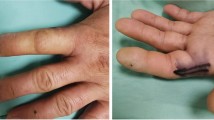Abstract
I HAVE made a collection of over fifty outlines of the fingers of European hands (right and left). At present I find that the tendency in the female hand is to a proportionately longer third than index, in both hands, than in the male. In all the hands I have examined, the third finger of the left hand (when longer than the index) is also proportionately longer than the same finger of the right. In this series I have found only one case of an index longer than the third, and only one in which they were equal (both males). These are all carefully drawn into a pocket-book, care being taken that the hand is perfectly free from any muscular strain, which alters the result very appreciably; and the race, sex, and general physical characteristics are noted on the sheet. The list at present includes some eminent classical scholars, a distinguished artist, and numbers of persons of more than average culture; yet there appears to be no correspondence between the mind and the length of the index finger.
This is a preview of subscription content, access via your institution
Access options
Subscribe to this journal
Receive 51 print issues and online access
$199.00 per year
only $3.90 per issue
Buy this article
- Purchase on SpringerLink
- Instant access to the full article PDF.
USD 39.95
Prices may be subject to local taxes which are calculated during checkout
Similar content being viewed by others
Rights and permissions
About this article
Cite this article
N., R. [Letters to Editor]. Nature 13, 68–69 (1875). https://doi.org/10.1038/013068d0
Issue date:
DOI: https://doi.org/10.1038/013068d0



